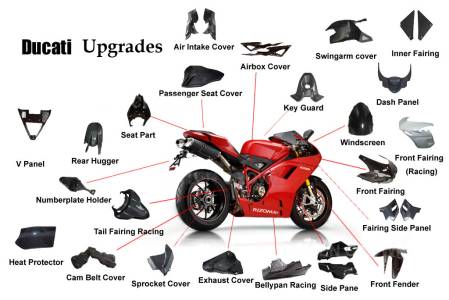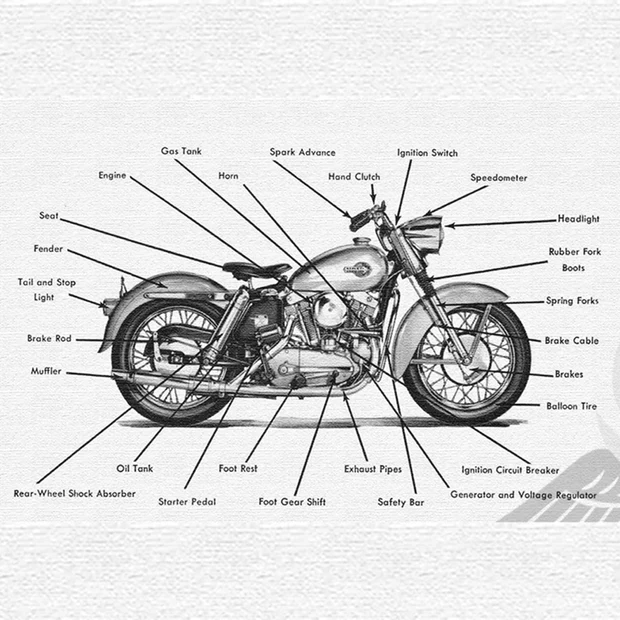Discover the Important MotorBike Components You Need for Optimum Performance
Understanding the important parts of a motorbike is basic for achieving peak efficiency. Each component, from the engine to the braking system, plays a critical function in general capability and safety and security. Normal maintenance can prevent unexpected failings and boost the riding experience. Nonetheless, many bikers forget the details of these systems. Finding how they interact can bring about an extra efficient ride. What crucial parts should every motorcyclist focus on?
The Engine: The Heart of Your Motorbike
The engine offers as the core part of a motorcycle, driving its efficiency and defining its abilities. It is responsible for converting fuel right into mechanical energy, which powers the bike onward. Different kinds of engines are utilized, including single-cylinder, V-twin, and inline setups, each offering distinctive features matched for various riding purposes and designs. The engine dimension, usually gauged in cubic centimeters (cc), considerably affects efficiency, with larger engines normally supplying even more power and torque.Furthermore, the engine's style and modern technology, such as fuel shot systems or air-cooling versus liquid-cooling, affect effectiveness and dependability. Maintenance is necessary for peak operation; variables like normal oil changes and checking ignition system warranty durability. Cyclists typically consider an engine's responsiveness and smoothness, as these characteristics enhance the overall riding experience. Inevitably, the engine stays a crucial element that specifies not just the motorcycle's performance but also the cyclist's link to the maker.
The Transmission: Moving Gears Efficiently
The transmission plays a necessary duty in a motorcycle's efficiency, specifically in the mechanics of equipment moving. Recognizing just how to change equipments efficiently can boost the overall riding experience, while regular upkeep guarantees peak functionality. Proper attention to these elements can substantially affect the longevity and performance of the motorbike.

Gear Shifting Mechanics
Smooth gear changing is crucial for optimal motorbike performance, considerably affecting both acceleration and control. The auto mechanics of equipment moving include the communication in between the clutch, gear lever, and transmission system. When a motorcyclist involves the clutch, it disengages the engine from the transmission, permitting an equipment adjustment without harming the parts. A well-timed release of the clutch, combined with specific motion of the gear lever, promotes a seamless change in between gears. This process ensures that the engine runs within its ideal power band, boosting efficiency. Motorcycle Parts Auckland. Furthermore, understanding the gear ratios and their result on rate and torque can help motorcyclists make educated choices throughout changes, ultimately adding to an extra delightful and receptive riding experience
Maintenance Tips Relevance
Routine maintenance plays a crucial role in ensuring that the transmission system runs effectively, permitting smooth equipment shifts. On a regular basis changing the transmission and checking liquid is vital, as old fluid can lead to enhanced friction and wear. In addition, evaluating the clutch for wear assurances peak engagement and disengagement, preventing slippage during equipment adjustments. Lubrication of moving parts is similarly essential to minimize rubbing and boost efficiency. Motorcycle proprietors need to additionally keep track of for leakages and uncommon noises, as these can indicate underlying problems. By sticking to these maintenance pointers, riders can lengthen the lifespan of their transmission system, assuring that gear shifts stay seamless and adding to the total efficiency of their motorcycle.
The Braking System: Ensuring Security on Every Ride
Braking systems are fundamental components that directly affect a motorbike's safety and security and performance. They contain various components, including brake pads, rotors, calipers, and hydraulic lines, all functioning with each other to ensure reliable slowdown. The kind of stopping system-- usually either disc or drum-- influences responsiveness and quiting power.Regular upkeep is important to promote peak performance; worn brake pads can result in lowered performance and enhanced quiting distances. In addition, the high quality of brake liquid ought to be kept track of, as it can take in moisture gradually, compromising braking efficiency.Riders need to additionally think about the relevance of anti-lock braking systems (ABS), which stop wheel lockup throughout abrupt stops, improving general safety. Properly working brakes are not nearly quiting; they infuse confidence in the biker, enabling much safer navigating via various terrains. Inevitably, a dependable stopping system is critical for taking pleasure in every adventure with tranquility of mind.
The Suspension: Enhancing Comfort and Control
A well-functioning shock absorber substantially adds to a motorcycle's general performance, complementing the performance of the braking system. The suspension plays a considerable role in absorbing shocks from irregular surfaces, assuring a smoother ride while preserving tire call with the roadway. This contact is important for both security and control, permitting cyclists to browse edges with self-confidence and precision.Different kinds of suspension systems, such as telescopic forks or mono-shocks, offer differing levels of comfort and handling. Effectively tuned suspension improves responsiveness, providing the cyclist with an extra linked feeling to the motorcycle. Normal upkeep checks are very important to ascertain the suspension components, including dampers and springtimes, are functioning at their best. An efficient suspension system not only elevates the riding experience but additionally adds to the longevity of other motorcycle components by check this site out minimizing damage. Therefore, purchasing top quality suspension is vital for any major motorbike lover.
The Tires: Attaching You to the Road
Tires play an essential function in a motorcycle's performance, working as the primary link between the road and the biker. Recognizing the various sorts of tires offered can significantly affect dealing with and safety and security. Additionally, normal upkeep is crucial to guarantee peak tire efficiency and long life.
Tire Enters Explained
How do various tire kinds influence a motorcycle's performance? Tire kinds play a crucial role in identifying a motorcycle's handling, grip, and security. Sport tires, developed for high performance, offer enhanced grip and responsiveness on paved roads, making them optimal for racing and hostile riding. On the other hand, visiting tires focus on durability and comfort, supplying a smoother adventure for long-distance traveling. Off-road tires, characterized by their tough step patterns, stand out in traction on unpaved surface areas, suitable for experience lovers. Additionally, dual-sport tires blend characteristics from both on-road and off-road groups, satisfying flexible riding demands. Inevitably, picking the appropriate tire kind is crucial for enhancing performance, ensuring safety and security, and improving the general riding experience.
Upkeep Tips Offered
While riding when driving, maintaining optimal tire condition is essential for security and performance. Frequently checking tire stress is very important, as under-inflated tires can lead to bad handling and enhanced wear. It is suggested to evaluate tread depth often; used tires compromise grasp and stability. Additionally, cyclists should try to find indications of damages, such as bulges or cracks, which can indicate the demand for replacement. Turning tires periodically assures even wear, improving longevity. Keeping tires tidy from particles and avoiding too much visuals can lengthen their life-span. Maintaining correct alignment and balance adds to come to a head efficiency, decreasing stress and anxiety on other bike elements. Following these maintenance tips will significantly boost the total riding experience.
The Gas System: Fueling Efficiency and Performance
The fuel system plays a crucial duty in making best use of a motorbike's performance and efficiency, as it guarantees the ideal shipment of fuel to the engine. It makes up numerous critical components, including the gas container, gas pump, gas filter, and gas injectors or carburetor. Each part has to function effectively to ensure a smooth and powerful ride.The fuel container shops gasoline and supplies it to the engine through the gas pump, which creates the required pressure. A fuel filter avoids contaminants from going into the engine, while the injectors or carburetor mix fuel with air for combustion.Proper upkeep of the gas system is important; a stopped up filter or malfunctioning injector can bring about decreased performance and increased fuel consumption. By validating that the fuel system runs effectively, cyclists can take pleasure in improved throttle action, better gas economic situation, and on the whole boosted riding experience.
The Electrical System: Powering Your Ride
An effective electric system is important for the overall capability and security of a motorcycle, as it powers vital elements such as the ignition, lighting, and different electronic systems. This system includes the battery, which shops energy, and the generator, liable for producing power while the engine runs. The electrical wiring harness connects these parts, making sure reliable power distribution.Additionally, merges protect the system from overloads, his comment is here while relays aid regulate high-current tools with low-power signals. A well-maintained electric system enhances efficiency by making certain smooth starts and consistent operation of lights and signals, vital for rider presence and safety.Regular checks of the battery's cost and links are essential for preventing electrical failings. Cyclists should additionally evaluate electrical wiring for wear and tear, ensuring all elements work preferably. Inevitably, a robust electrical system adds substantially to the overall efficiency and reliability of the motorcycle.
Often Asked Inquiries
Exactly how Commonly Should I Replace My Bike's Battery?
The regularity of motorbike battery replacement depends on use and maintenance (Motorbike Components NZ). Typically, batteries need to be changed every three to 5 years. Routine checks can help identify when a substitute is needed for peak efficiency
What Devices Do I Need for Fundamental Bike Maintenance?
For standard motorcycle upkeep, one needs crucial devices such as a socket collection, wrenches, screwdrivers, pliers, tire stress scale, and a torque wrench. These devices promote efficient upkeep and assure the motorbike runs effectively and safely.
How Can I Enhance My Motorcycle's The rules of aerodynamics?
To boost bike the rules of aerodynamics, one ought to consider readjusting fairings, using windscreen extensions, maximizing body placement, and reducing overall weight. These view it adjustments help reduce drag, boosting security and gas performance during adventures.
What Are the Indications of a Failing Electric System?
Signs of a falling short electrical system include dimming lights, difficulty starting, irregular instrument analyses, and blown fuses. Motorbike Components NZ. Uncommon smells or deterioration around battery terminals may additionally suggest underlying concerns requiring prompt interest for safety and security and performance

Exactly how Do I Select the Right Oil for My Motorcycle?
When choosing oil for a motorbike, one ought to take into consideration the supplier's specs, viscosity scores, and the sort of riding. In addition, standard versus artificial oil can influence performance and engine defense, influencing the choice substantially. The engine size, normally measured in cubic centimeters (cc), considerably influences performance, with bigger engines normally supplying more power and torque.Furthermore, the engine's style and innovation, such as gas injection systems or air-cooling versus liquid-cooling, influence performance and integrity. A well-functioning suspension system significantly contributes to a motorcycle's overall performance, matching the performance of the braking system. The fuel system plays a vital duty in maximizing a motorbike's efficiency and performance, as it guarantees the ideal shipment of gas to the engine. A gas filter avoids impurities from getting in the engine, while the injectors or carburetor mix gas with air for combustion.Proper maintenance of the gas system is vital; a blocked filter or malfunctioning injector can lead to reduced efficiency and boosted fuel consumption. A properly maintained electric system improves performance by ensuring smooth starts and consistent procedure of signals and lights, crucial for rider visibility and safety.Regular checks of the battery's cost and links are crucial for avoiding electric failures.